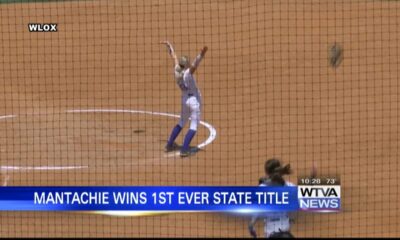Mississippi Today
Dozens of Uber rides requested in first month of health access program

In its first month of operation, the new Uber program that takes Mississippians to county health department appointments received 58 transportation requests.
Without a marketing plan for the initiative and just a month of data, it's not clear how effective the program is yet at increasing health care access in Mississippi.
The Uber initiative is aimed at making it easier to get to county health departments where an increasing number of Mississippians may be seeking care. The ongoing health crisis has forced hospitals to stem services to stay open, making it harder to access care nearby.
Transportation can be a major barrier to receiving health care in rural Mississippi, resulting in “no shows” at county health department appointments. According to State Health Officer Dr. Daniel Edney, Mississippi county health departments currently experience a 50% no-show rate.
More than 1 in 5 people without transportation missed or skipped a medical appointment in 2022, and people of color and people with low incomes were more affected, one survey says.
However, the new program is only available in counties with Uber services, which many rural parts of the state don't have.
The state Department of Health did not answer a question about which Mississippi counties have Uber services.
In November, the first month of the program's operation, the requests came from 21 counties: Alcorn, Clarke, Copiah, DeSoto, Forrest, Grenada, Hinds, Jones, Lamar, Lauderdale, Lincoln, Madison, Noxubee, Oktibbeha, Pontotoc, Rankin, Tippah, Tishomingo, Walthall, Warren and Yazoo.
The state Department of Health's one-year emergency contract with Uber says that the agency will pay Uber Health up to $1 million for non-emergency services transporting patients to their health department appointments, to a pharmacy if needed and then returning them home. It'll all be scheduled by the health department through an internal dashboard, and the rider doesn't have to pay.
All patients have to do is contact the health department's call center, said Victor Sutton, the state Health Department's chief of community health and clinical services, or ask about a ride when they schedule an appointment.
“The great thing about this program is MSDH patients will not need the Uber app,” he said via email. “The Health Equity Team will ensure that rides are scheduled, clients have received their notifications and reminders, and will round out the process with a follow up after the rides are completed.”
The program is being funded by a grant through state and federal programs to address COVID-19 health disparities.
Agency officials also say they hope the initiative creates jobs by bringing Uber to more parts of the state.
It's not clear if that's happened yet — an agency spokesperson said the state Health Department is still gathering data to “address gaps” and will soon create a marketing plan “to support driver availability within the program service area.”
Rideshare services have expanded to the health care market in recent years. However, some studies show that rideshare availability doesn't have a significant impact on missed health care appointments.
This article first appeared on Mississippi Today and is republished here under a Creative Commons license.
Mississippi Today
On this day in 1896


MAY 18, 1896

The U.S. Supreme Court ruled 7-1 in Plessy v. Ferguson that racial segregation on railroads or similar public places was constitutional, forging the “separate but equal” doctrine that remained in place until 1954.
In his dissent that would foreshadow the ruling six decades later in Brown v. Board of Education, Justice John Marshall Harlan wrote that “separate but equal” rail cars were aimed at discriminating against Black Americans.
“In the view of the Constitution, in the eye of the law, there is in this country no superior, dominant, ruling class of citizens,” he wrote. “Our Constitution in color-blind and neither knows nor tolerates classes among citizens. In respect of civil rights, all citizens are equal before the law. The humblest is the peer of the most powerful. The law … takes no account of his surroundings or of his color when his civil rights as guaranteed by the supreme law of the land are involved.”
This article first appeared on Mississippi Today and is republished here under a Creative Commons license.
Did you miss our previous article…
https://www.biloxinewsevents.com/?p=359301
Mississippi Today
Renada Stovall, chemist and entrepreneur
Renada Stovall sat on the back deck of her rural Arkansas home one evening, contemplating life when she had a life-altering epiphany…
“I gotta get out of these woods.”
She heard it as clear as lips to her ear and as deep as the trees surrounding her property. Stovall's job as a chemist had taken her all over the country. In addition to Arkansas, there were stints in Atlanta, Dallas and Reno. But she was missing home, her parents and friends. She also knew, she needed something else to do.
“I thought, what kind of business can I start for myself,” said Stovall, as she watered herbs growing in a garden behind her south Jackson home. Some of those herbs are used in her all-natural products. “I know when I lived in Reno, Nevada, where it's very hot and very dry, there really weren't products available that worked for me, my hair, and my skin suffered. I've got a chemistry degree from Spelman College. I took the plunge and decided to create products for myself.”

In 2018, Stovall's venture led to the creation of shea butter moisturizers and natural soaps. But she didn't stop there, and in December 2022, she moved home to Mississippi and got to work, expanding her product line to include body balms and butters, and shampoos infused with avocado and palm, mango butter, coconut and olive oils.
Nadabutter, which incorporates Renada's name, came to fruition.

Stovall sells her balms and moisturizers at what she calls, “pop-up markets,” across the state during the summer. She's available via social media and also creates products depending on what of her ingredients a customer chooses. “My turmeric and honey is really popular,” Stovall added.
“The all-natural ingredients I use are great for conditioning the skin and hair. All of my products make you feel soft and luscious. The shea butter I use comes from West Africa. It's my way of networking and supporting other women. And it's my wish that other women can be inspired to be self-sufficient in starting their own businesses.”





This article first appeared on Mississippi Today and is republished here under a Creative Commons license.
Mississippi Today
On this day in 1954
MAY 17, 1954

In Brown v. Board of Education and Bolling v. Sharpe, the U.S. Supreme Court unanimously ruled that the “separate but equal” doctrine in Plessy v. Ferguson was unconstitutional under the 14th Amendment, which guaranteed equal treatment under the law.
The historic decision brought an end to federal tolerance of racial segregation, ruling in the case of student Linda Brown, who was denied admission to her local elementary school in Topeka, Kansas, because of the color of her skin.
In Mississippi, segregationist leaders called the day “Black Monday” and took up the charge of the just-created white Citizens' Council to preserve racial segregation at all costs.
This article first appeared on Mississippi Today and is republished here under a Creative Commons license.
-
SuperTalk FM6 days ago
Martin Lawrence making 3 stops in Mississippi on comedy tour
-
Our Mississippi Home4 days ago
Beat the Heat with Mississippi’s Best Waterparks
-
SuperTalk FM2 days ago
State auditor cracking down on Mississippians receiving unemployment benefits
-
Our Mississippi Home5 days ago
Charlie’s U-Pik: Opening Soon for the Summer Season
-
Mississippi News Video4 days ago
Jackson has a gang problem
-
Kaiser Health News5 days ago
Medicaid ‘Unwinding’ Decried as Biased Against Disabled People
-
228Sports4 days ago
George County Pours Runs In 6A South State Title Victory At PRC
-
Local News1 day ago
Family files lawsuit after teen’s suicide in Harrison County Jail









































